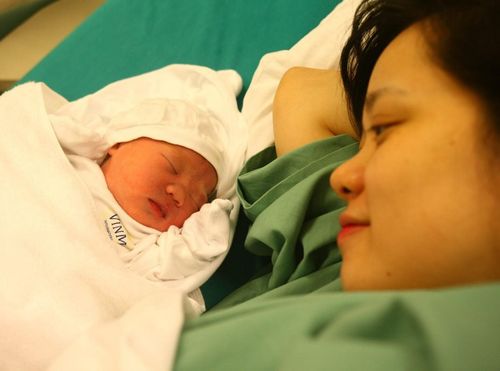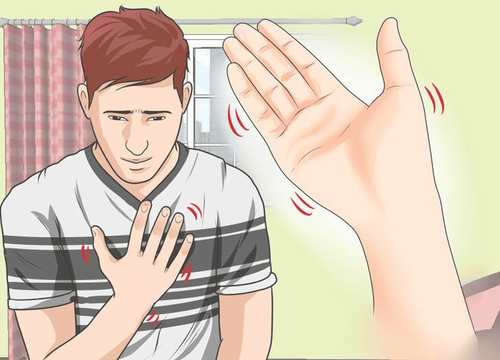This is an automatically translated article.
Giving birth is an emotional, exhausting experience and hormone levels change dramatically in the first few days after giving birth. At that time, the mother may develop baby blues but it usually only lasts a few days.
1. What is baby blues syndrome?
About 80% of postpartum mothers have baby blues syndrome, this syndrome refers to a short period of time after giving birth, mothers experience sadness, anxiety, stress and mood swings . Research shows that 4 out of 5 moms experience these symptoms, so chances are you'll have them too.
Baby blues usually appear within a few days of giving birth, but if you're having trouble giving birth, you may develop symptoms of this syndrome earlier.
Although doctors cannot pinpoint the exact cause of this syndrome, recent studies have revealed mysteries related to this syndrome. After giving birth, your body goes through extreme hormonal fluctuations to help you recover and care for your baby, shrink your uterus back to its normal size, promote lactation, and many other processes. other changes. These hormonal changes can also affect the psychological state of the mother after giving birth.
Also, the postpartum period is a period where parents don't sleep or have trouble sleeping regularly and deal with all the major changes in habits and lifestyle when it comes to caring for a new baby. All of these factors combine to cause baby blues.

Hội chứng baby blues thường xuất hiện trong vài ngày sau khi sinh
2. What are the symptoms of baby blues syndrome?
Symptoms may begin 2 to 3 days after birth. In most cases, baby blues will go away on their own shortly after birth or usually within 10 days but sometimes up to 14 days after birth. Common symptoms of baby blues include:
Feeling depressed after giving birth, wanting to cry or crying without knowing the cause Being in a mood swings or especially being irritable Feeling disconnected bonding with your baby Loss of old habits such as the freedom to go out with friends Worry or feel worried about your baby's health and safety Feeling restless or sleepless, tired after giving birth Difficulty when making easy decisions or thinking clearly
3. How is baby blues different from postpartum depression?
There are two main indicators that the sadness you feel after giving birth is more than the baby blues syndrome is the time it occurs and the severity of the symptoms.
Timeline If you still feel sad, anxious or overwhelmed 2 weeks after giving birth, it could be a sign of postpartum depression. (baby blues usually don't last more than 2 weeks.)
Baby blues also come on pretty quickly after giving birth, so if you suddenly start experiencing depressive symptoms weeks or months after birth, it's not baby blues. Postpartum depression can happen any time during the first year after giving birth.
Severity of symptoms Severity is often subjective and varies from person to person. Usually, the baby blues will leave you feeling down, but they shouldn't affect your quality of life. Postpartum depression, on the other hand, is not something that comes and goes easily throughout the day; symptoms are more persistent and do not go away on their own.

Thông thường, hội chứng baby blues sẽ khiến bạn cảm thấy hụt hẫng
4. Treatment of baby blues . syndrome
You don't have to do anything to treat baby blues, most cases find that as mothers adjust to their new roles and settle into routines with the baby, they begin to feel returned to himself.
That said, the postpartum period is tough and it's important that you take care of yourself as best you can. Finding the things that make you feel better during this transition can help you get back to normal, (or at least, find your new normal) a little faster.
Sleep as much as possible: In fact, although sleep is a very "luxury" in the newborn period, you should sleep when your baby sleeps and temporarily leave the laundry to handle. . It's important to note that things get worse when you're exhausted. Sometimes, sleep is the best remedy. Ask for help: Don't be afraid to ask friends or family for help with cooking, running errands, changing diapers, and don't try to do it all yourself. Eat well and go outside: Allowing yourself to enjoy your favorite foods and get some fresh air is a very effective remedy for stress or boredom. Talk to someone: Although you don't necessarily need to talk to a therapist, if you know someone who is a counselor or therapist, give them a call. If you don't have one, talk to a family member or friend who you feel close to and who will listen to what you feel. Do something you love: Whatever pre-baby makes you feel happy and comfortable, you should reintroduce those habits or hobbies, this will make it easier to get back to work. back to her postpartum life.
After 9 months and 10 days of heavy weight, pregnant women go into labor and face a level of labor pain comparable to 20 broken ribs at the same time. In order for the birth to go smoothly and safely, pregnant women need to understand: - How the labor process takes place, how long does it usually take to have a normal delivery or cesarean section, to protect the best health? for the unborn baby.
Methods to relieve pain during childbirth, limit pain and relieve psychological pressure during labor. The way to push and breathe during childbirth is usually the right way so that the labor takes place quickly, the pregnant woman does not lose strength during childbirth. How to control postpartum uterine contractions in the shortest time. How to take care of the perineal suture does not cause infection and dangerous complications. Early postpartum re-examination to detect dangerous abnormalities such as residual placenta, missing gauze. Take care of newborn until full month healthy. To ease the pain of childbirth, Vinmec offers a full Maternity program with a complete "painless delivery" service during and after birth using non-morphine epidural and sedation techniques. ashamed. During the birth process, the mother will be guided by the midwives on how to push and breathe properly, the baby will be born in just 10-15 minutes. After birth, the baby will be cared for in a sterile room before being returned to the mother.
Pregnant women will rest in a high-class hospital room, designed according to international hotel standards, 1 mother 1 room with full facilities and modern equipment. Mothers will be consulted by nutritionists on how to feed the baby before being discharged from the hospital. Postpartum follow-up with both mother and baby with leading Obstetricians and Paediatricians.
Please dial HOTLINE for more information or register for an appointment HERE. Download MyVinmec app to make appointments faster and to manage your bookings easily.
SEE MORE
Overcoming postpartum depression: What you need to know Can postpartum depression be cured? Postpartum depression may recur in subsequent pregnancies













